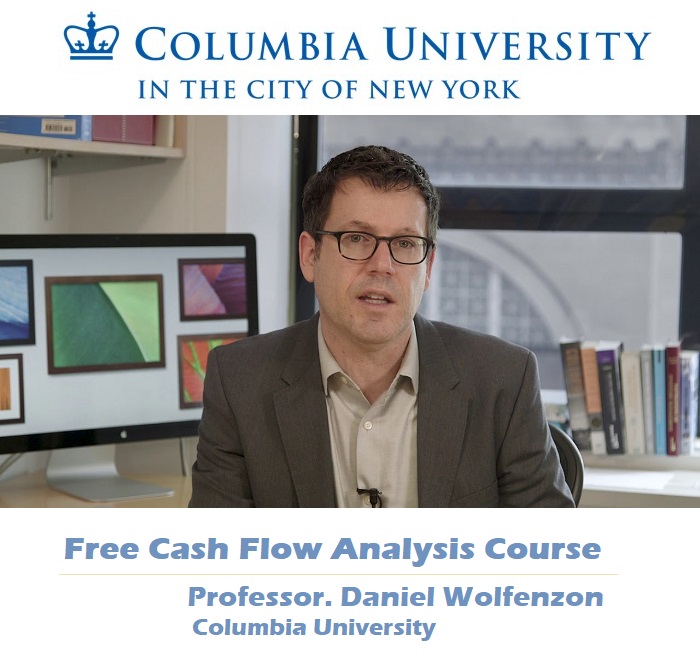Free Cash Flow Analysis – Columbia University
Free Cash Flow Analysis
Free online courses from Columbia University
Learn how to use the free cash flow method for firm valuation and how to compute and project free cash flows.
About ColumbiaX
Columbia University is one of the world’s most important centers of research and at the same time a distinctive and distinguished learning environment for undergraduates and graduate students in many scholarly and professional fields. The University recognizes the importance of its location in New York City and seeks to link its research and teaching to the vast resources of a great metropolis.
Teachers College, Columbia University’s affiliate graduate school of education, offers programs in education, health, leadership, and psychology that are perennially ranked among the nation’s best.
For more than 250 years, Columbia has been a leader in higher education in the nation and around the world. At the core of our wide range of academic inquiry is the commitment to attract and engage the best minds in pursuit of greater human understanding, pioneering new discoveries and service to society. Columbia University MOOCs
About this course
In this course, learners will begin to apply the lessons and concepts from Introduction to Corporate Finance as they begin to discuss basics of firm valuation.
Follow Professor Wolfenzon’s lead to learn how the free cash flow method is applied to value firms. You will also learn about valuation using multiples. Throughout the course, you will learn how to construct Excel models to value firms by completing hands on activities.
What you’ll learn
- How to value a firm using the Enterprise Discounted Cash Flow Method
- Project a firm’s cash flows
- Calculate residual value
- How to value a firm using multiples
Syllabus
- Week 1: Firm Valuation Framework
- Week 2: Calculation of Free Cash Flows
- Week 3: Financial Ratios and Projection of Free Cash Flows
- Week 4: Residual Value and Valuation Using Multiples
- Week 5: Putting it All Together: Valuation Case Study
Modules:
Module 1: Enterprise Discounted Cash Flow (DCF) Model
- Introduction
- Enterprise Discounted Cash Flow (DCF) Model
- Mini-Case: McAffee
- Mini-Case This content is graded
- Mini-Case Solution
Module 2: The Free Cash Flows (FCFs)
- Introduction
- The Free Cash Flows
- Mini-Case: LuluYoga
- Mini-Case This content is graded
- Mini-Case Solution
Module 3: Estimating Future Free Cash Flows (FCFs)
- Introduction
- Estimating Future Free Cash Flows
- Mini-Case: LuluYoga FCF
- Mini-Case This content is graded
- Mini-Case Solution
Module 4: Relative Valuation
- Introduction
- Relative Valuation
- Mini-Case: SoulBiking
- Mini-Case This content is graded
- Mini-Case Solution
Module 5: Valuation Case Study
- Introduction
- CORPFIN2x
- Mini-Case: XYZ Corp
- Mini-Case This content is graded
- Mini-Case Solution
Final Exam
Course Details
- Length: 5 Weeks
- Effort: 3–4 hours per week
- Price: FREE
- Institution: ColumbiaX
- Subject: Business & Management
- Level: Introductory
- Language: English
- Video Transcript: English
Prerequisites
Students must be familiar with basic concepts of Accounting; basic skills in Microsoft Excel (or equivalent); Students should have completed Introduction to Corporate Finance.

Instructors
Professor. Daniel Wolfenzon – Columbia University
Daniel Wolfenzon is the Stefan H. Robock Professor of Finance and Economics at Columbia Business School. He received a Masters and a PhD in economics from Harvard University and holds a BS in economics and a BS in mechanical engineering from MIT. He is also a Faculty Research Fellow at the National Bureau of Economic Research. Areas of Research:
His research interests are in corporate finance and organizational economics. He has studied control sharing in small firms, the effects of investor protection on ownership concentration, and the structure of business groups around the world. His most recent research focuses on family firms. He has examined the consequences of family succession on firm performance and also the importance of managerial talent in family controlled firms.


